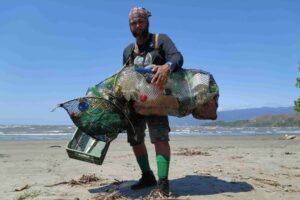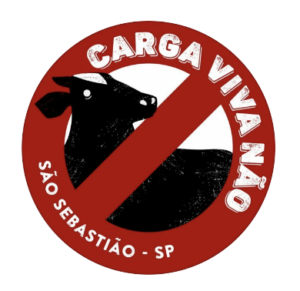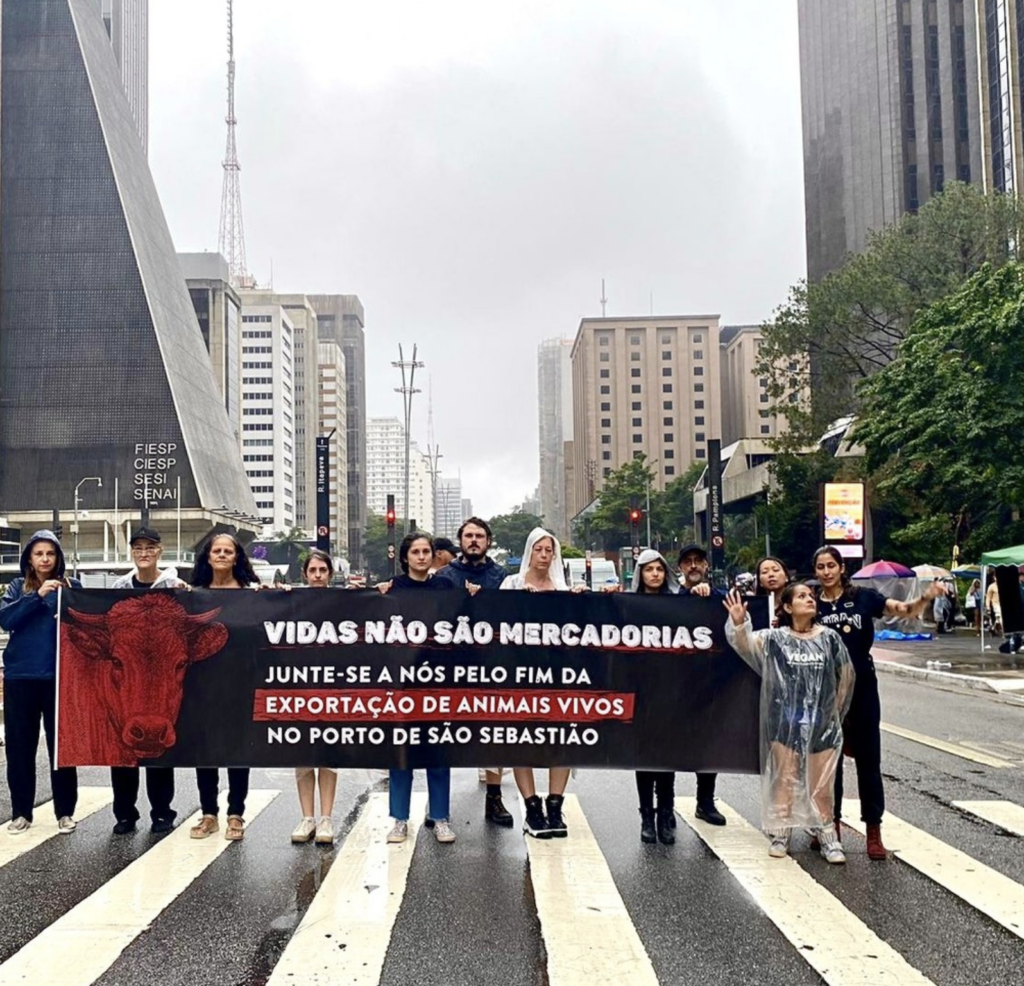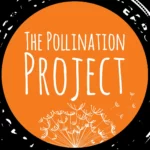Every human being is born into a place, immersed under determined circumstances, and surrounded by certain people; those are things we cannot avoid. Yet, we all can work towards making a change for the better in every aspect. It is precisely that hope that has been driving Fábio Fula to work tirelessly for over 3 years on the shores of São Sebastião in Brazil, hoping to motivate his community and beyond to protect the environment and care for animals.
Fábio is a Technician in Chemistry Sanitation from the Professional Training Center of the Northern Coast in Brazil. He was recognized by the Instituto Lixo Zero Brasil (Zero Waste Institute Brazil) in 2021 with the Citizen Attitude Title for being a role model and inspiring the community to rethink and practice more sustainable habits to create a positive impact on the environment.
Born in the coastal city of São Sebastião, Brazil, Fábio grew up with his two brothers Osmar Júnior and Rodrigo Aparecido. He still remembers dearly how his father Osmar was one of the biggest influences in his life.
“During our adventures, walks, and contemplation of nature, my father used to teach us – through his actions – his commitment to make the world a better place,” says Fabio. “His embodiment of kindness, education, respect for others, and care for nature has made him an endless source of inspiration for family, friends, and other people.”
His father was a descendant of the African tribes who were brought to Brazil enslaved. Fabio’s mother also played a very important role in his life. She had a soft spot for animals and enjoyed having them at home.
“I have always lived with domestic animals, such as cats and dogs, adopted by my mother, especially cats,” recalls Fabio.
Beach Clean-Ups in Brazil
Inspired by his late father, Fábio began participating as a volunteer collecting waste from nature, especially at the shore.
“I have been doing it for the last 3 years,” says Fábio. “I always came across abandoned animals, and I ended up adopting 6 cats and 1 dog. Besides the pet cat, I had already rescued in the urban area in 2017.”
 Fábio founded a group called Psicoletores where he registers the beach clean-up events as well as all the things he finds on the beach which include: plastic and glass bottles, bottle caps, toys, pacifiers, wire, pen caps, plastic bags, metal food containers, chemical wraps, and more. Some of the items he has collected are not even made or sold in Brazil and come from places as far as China, India, Malaysia, the United States, Turkey, Germany, and more.
Fábio founded a group called Psicoletores where he registers the beach clean-up events as well as all the things he finds on the beach which include: plastic and glass bottles, bottle caps, toys, pacifiers, wire, pen caps, plastic bags, metal food containers, chemical wraps, and more. Some of the items he has collected are not even made or sold in Brazil and come from places as far as China, India, Malaysia, the United States, Turkey, Germany, and more.
“We were able to influence many people to practice new habits, especially in the local region where we live. Also reaching and influencing in a certain way, the government institutions,” says Fábio. “Working with the community is always very rewarding. A very dear story is when I participated as a volunteer in the Mangrove of the Cove Project (Institute Earth & Sea), where we fought to transform a mangrove swamp into an environmental preservation area. The commitment of everyone there was great. Now that area is a sanctuary for fauna and flora.”
As Fábio continued to work along the ocean, he noticed how cargo ships had a big role in polluting the area and, soon after, he began paying attention to the thousands of animals that were shipped alive to be slaughtered overseas after a long journey of suffering.
“During the waste collections, cross-referencing the international waste information with the ships that are in our port region, I ended up connecting to the Carga Viva Não Group (Movement Live Cargo No), formed by residents of São Sebastião, who fight against the mistreatment of animals, against the imminent risk that the transport of animals through ships can cause to the environment,” says Fábio.
“I would like to invite everyone to initiate change in the place where they live so that we can meet each other along the way and achieve a global change.”
Live Animal Exports in Brazil
Brazil is the #1 beef exporter in the world, with an estimated 3.35 million metric tons carcass weight equivalent in 2023, and is projected to have an increase in swine production in 2023 and 2024, according to the Foreign Agricultural Service of the United States Department of Agriculture.
A great amount of the meat produced in Brazil is not destined for its population. The country exports around 30% of its beef production. But the animal consumption industry in Brazil also exports live animals to far away destinations subjecting them to terrible conditions.
According to the Livestock and Products Annual Report Brazil made by the Foreign Agricultural Service of the United States Department of Agriculture, the country was estimated to export 375 thousand head of live cattle in 2023, which had an increase of 220% from the period of January to July 2022 due to growing demand in Turkey. And the cattle are expected to reach over 455 thousand heads in 2024. Those destined for Turkey are sent by sea on a trip that lasts from 18 to 20 days.
Furthermore, according to the Humane Society International when live animals are transported on ships they have to endure extremely long trips where they don’t even have enough space to lie down or to access food or water. And it gets even worse when they have to endure the summer temperatures.
In 2022, live animals were sent from Brazil to far away destinations such as Iraq with 19.6% of its live animal exports, Jordan with 10.6%, Turkey with 9.68%, Saudi Arabia with 7.5%, and Argentina with 5.98%, among others, according to the Observatory of Economic Complexity.
The “Carga Viva Não” Movement
 The “Carga Viva Não São Sebastião” Movement (Live Cargo No Movement) originated from protests against live animal exports in the neighboring city of Santos, in São Paulo, in 2018. The successful banning in that city inspired residents of the port city of São Sebastião to come together to ban the export of live animals from their city. With the onset of Covid, the group disbanded but reconnected in October 2023. Since then, with the help of The Pollination Project, the group has been growing and organizing increasingly to ban the export from the third-largest port in Brazil, which exported around 136 thousand live animals in 2023. Brazil is the second-largest exporter of live animals in the world, trailing only Australia, and it exports animals on long sea voyages to countries in the Middle East and North Africa.
The “Carga Viva Não São Sebastião” Movement (Live Cargo No Movement) originated from protests against live animal exports in the neighboring city of Santos, in São Paulo, in 2018. The successful banning in that city inspired residents of the port city of São Sebastião to come together to ban the export of live animals from their city. With the onset of Covid, the group disbanded but reconnected in October 2023. Since then, with the help of The Pollination Project, the group has been growing and organizing increasingly to ban the export from the third-largest port in Brazil, which exported around 136 thousand live animals in 2023. Brazil is the second-largest exporter of live animals in the world, trailing only Australia, and it exports animals on long sea voyages to countries in the Middle East and North Africa.“My motivation for ending the export of animals is to put an end to those activities that affect the lives of all of us. These practices cause massive deforestation, some even in indigenous areas, caused by lack of oversight and corruption,” says Fabio. “This deforestation, in addition to cattle ranching activities, is one of the causes of climate change.”
The fight against live animal export in Brazil is gaining momentum with a national grassroots mobilization fueling debates at both the popular level and within public bodies and NGOs. This is due to the work of grassroots activists in São Sebastião and São Paulo, coupled with the exposure the issue gained after the incident in Australia where more than 16,000 sheep were abandoned at sea, garnering international attention to the practice.
“On the subject of animal exports, what I would like most is to demonstrate that there is no sustainability in this type of activity,” says Fabio. “We can see that a wide variety of activities carried out by industrial farming cause a huge problem: the destruction of our environment.”
With the help of volunteer animal rights lawyer Letícia Filpi, the bill 02/24 was filed to end the export of live animals from the Port of São Sebastião. After three months of an intense campaign that made the bill extremely popular in the port city, it was declared unconstitutional by a committee of the São Sebastião City Council in a political maneuver to prevent council members opposed to the bill from having to expose themselves in a municipal election year, and the bill was shelved. This does not mean the end of the battle; it served to make the issue extremely popular in São Sebastião and gave momentum to the movement, which is already planning new strategies.

An Image is Worth a Thousand Words
In order to support the “Carga Viva Não” movement, Fábio will work on capturing images and videos of live cargo ships arriving at the port of São Sebastião, and the loading process, providing crucial evidence to support advocacy efforts.
“This project is indispensable because, without images, it is as if nothing is happening, and such visual documentation is crucial for motivating activists and educating the community about the shipments of live animals in São Sebastião,” says Fábio. “The cruelty during the transport of this export is also a terrible thing that deserves an end.”
Fábio will share documented materials with the press, NGOs, and social media platforms to raise awareness about the issue of live animal export in São Sebastião, amplifying the urgency and significance of the cause.
For this project, Fabio decided to look for funding to buy a professional camera that would allow him to film high-quality images from a distance since the ships are not close to the shore. Through Brazil coordinator Beatriz Cossermelli, Fábio learned about The Pollination Project and applied for the grant.
“Receiving a subsidy for this project was very gratifying. I am very grateful to TPP for the opportunity to improve my volunteer work,” says Fábio.
For Fábio, the biggest challenge in his journey is being persistent but knowing that he is making a difference for the animals and the environment keeps him motivated and hopeful. He plans to continue working on beach clean-ups and giving speeches to children about environmental care.
“The biggest challenge I face is to be persistent because there is a lot of work to be done. But something very gratifying is when I participate in actions at schools or local projects. Children make me feel a lot of hope for a better world,” says Fábio. “I believe that work similar to the one we do all over the world is the beginning of a new era.”
Article by Liza Di Georgina and Beatriz Cossermelli
Join Us
If you are inspired by this work and have an idea for a project that addresses an issue that you are passionate about, we’d like to invite you to submit an application and together we will build a better, more compassionate future!
If you would like to support the work of more heartivists like this around the world, please visit our donation page and be a part of the change today!


![🌍 Discover Inspiring Stories from Global Changemakers 🌍
Every week, we bring you stories that will touch your heart and inspire your soul. These are the stories of individuals who embody courage, passion, kindness, and compassion. They are the changemakers who are actively creating a brighter world for us all.🤝
In a world filled with challenges, we believe it's important to shine a spotlight on the good, the kind, and the inspiring. Our "Good News Friday" newsletter is your weekly source of hope and optimism and the it will help you to witness the amazing impact of a $1,000 seed grant.
Subscribe today and embrace the power of good news 👉🏽 https://buff.ly/462kttF [link in profile]](https://thepollinationproject.org/wp-content/plugins/instagram-feed-pro/img/placeholder.png)